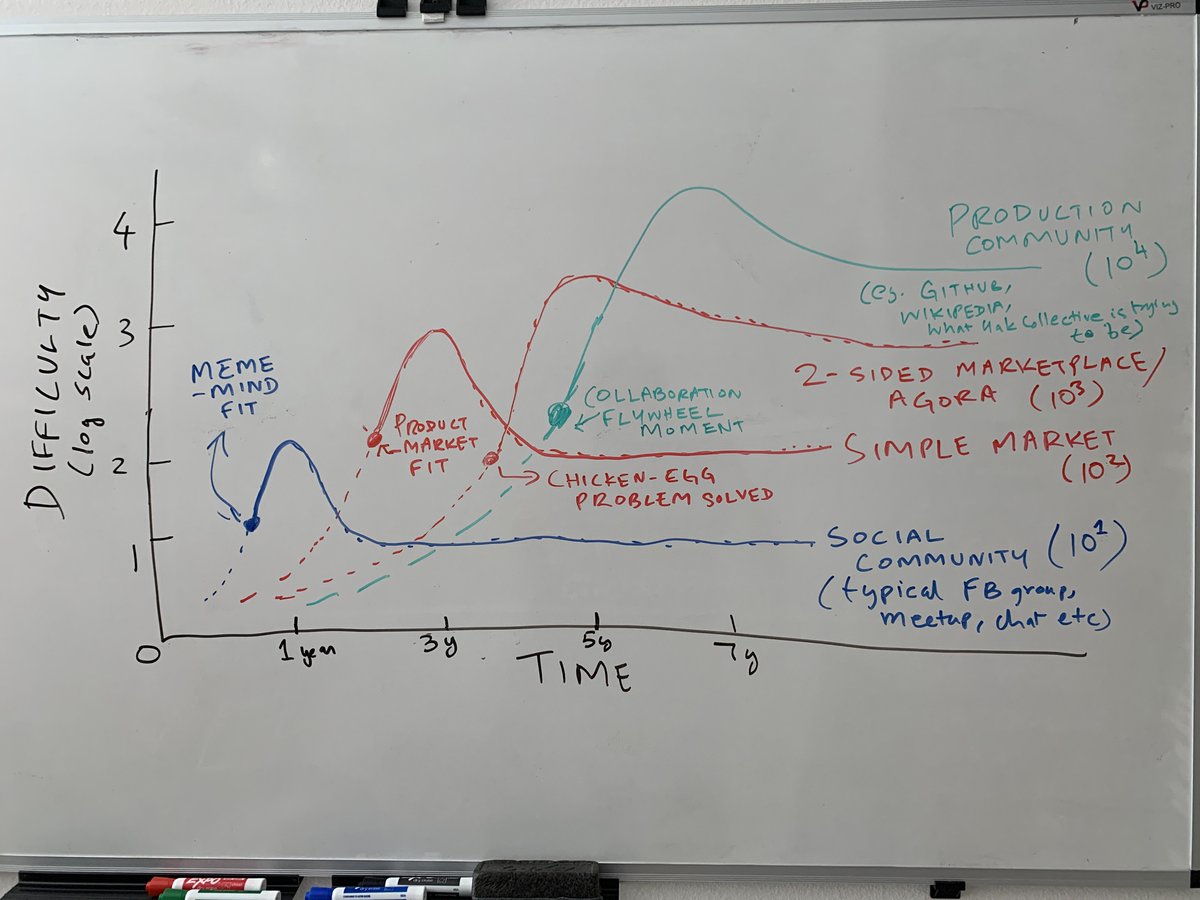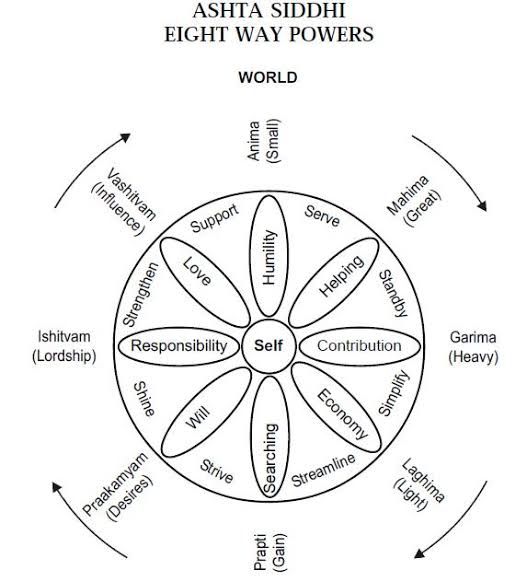The way to read the graph is: each line is a time history of difficulty. It starts dotted, goes through a criticality inflection point, and then crests in difficulty before coming down to a stable plateau.
following a discussion at @yak_collective this morning, I came up with this chart to capture a hypothesis I have that the difficulty of creating communities scales exponentially with the the "depth" of what you're trying to do

The way to read the graph is: each line is a time history of difficulty. It starts dotted, goes through a criticality inflection point, and then crests in difficulty before coming down to a stable plateau.
And even *talk* communities ain't easy. Failure rate is like 95%.
More from Venkatesh Rao
I’m guessing these responses really reflect people’s weighted averages (age*current average effort fraction) though I kept it simple and asked for just averages.
I suspect a healthy weighted average should be ~ (age-20)/2. So a 30 year old should be at 5, a 40 year old at 10, a 50 year old at 15 etc.
Standard deviation should be ~average/3 maybe, so distribution spreads as you age and accumulate projects and get better at them.
Other things being equal, people get good at starting in their 20s, at follow through in 30s, at finishing in 40s.
No point learning food follow through until you’ve found a few good starts to bet on. No point getting good at finishing until a few projects have aged gracefully.
I’m in the 7+ range myself. Probably 8-9. Slightly less than healthy for my age.
I suspect most self-judgments on being good starters/follow-through-ers/finishers are really flawed because of the non-ergodicity of project management skill learning. You can’t learn good practices for the 3 phases in an arbitrary order. On,y one order actually works.
Poll: where is the temporal center of gravity of all your live projects based on average age of start-dates?
— Venkatesh Rao (@vgr) January 17, 2021
I suspect a healthy weighted average should be ~ (age-20)/2. So a 30 year old should be at 5, a 40 year old at 10, a 50 year old at 15 etc.
Standard deviation should be ~average/3 maybe, so distribution spreads as you age and accumulate projects and get better at them.
Other things being equal, people get good at starting in their 20s, at follow through in 30s, at finishing in 40s.
No point learning food follow through until you’ve found a few good starts to bet on. No point getting good at finishing until a few projects have aged gracefully.
I’m in the 7+ range myself. Probably 8-9. Slightly less than healthy for my age.
I suspect most self-judgments on being good starters/follow-through-ers/finishers are really flawed because of the non-ergodicity of project management skill learning. You can’t learn good practices for the 3 phases in an arbitrary order. On,y one order actually works.
Heh, one thing the nyt piece managed was to do a Cunningham's law nerdsnipe-wmd at newspaper scale... now a bunch of people are energetically trying to post the right answer.
IMO trying to correct whatever the NYT writer thought he knew/understood is futile. "Willing to be misunderstood by the NYT" should be the default stance unless you want to waste a lot of time correcting an obsolete 2013 map for people who don't care.
The thing is, the NYT still has enough normative cultural power, even as it has fallen from newspaper-of-record, that it takes a particular sort of heretical self-confidence to sort of ignore whatever they happen to be wrong about on any given week, whether or not it concerns you
A subtle shift has occurred in the workings of the Gell-Mann amnesia effect. It used to be an individual private amnesia re: media ("I'll believe myself when I am certain they got it wrong because I'm an expert, but still believe them when I am not"). Now it's a collective effect
A sort of common-knowledge threshold has been crossed lately. "Everybody knows that everybody knows the NYT is wrong on X across largish subcultures." It's no longer mutual beliefs being validated occasionally 1:1.
One other thing I should really clarify and that the @nytimes piece got *severely* wrong: while I believe there are very strong sociological and even causal links between rationalism and NRx (especially in the Silicon Valley homes bases) their ideological and methodological
— (((E. Glen Weyl))) (@glenweyl) February 14, 2021
IMO trying to correct whatever the NYT writer thought he knew/understood is futile. "Willing to be misunderstood by the NYT" should be the default stance unless you want to waste a lot of time correcting an obsolete 2013 map for people who don't care.
The thing is, the NYT still has enough normative cultural power, even as it has fallen from newspaper-of-record, that it takes a particular sort of heretical self-confidence to sort of ignore whatever they happen to be wrong about on any given week, whether or not it concerns you
A subtle shift has occurred in the workings of the Gell-Mann amnesia effect. It used to be an individual private amnesia re: media ("I'll believe myself when I am certain they got it wrong because I'm an expert, but still believe them when I am not"). Now it's a collective effect
A sort of common-knowledge threshold has been crossed lately. "Everybody knows that everybody knows the NYT is wrong on X across largish subcultures." It's no longer mutual beliefs being validated occasionally 1:1.
Both this thread and the outraged response threads are... something.
This is why I never wanted kids. Way too much responsibility for another human’s development. Depending on the child, this might either be the day they discovered who they were or the day that traumatized them into a lifelong fuckup. Either way I don’t want to direct the show.
As far as the can opener goes, it wouldn’t even occur to me to try and turn it into a teachable moment. That sounds vaguely quixotic. I’d just show them how immediately. I think my default is to try and instruct clearly but not demonstrate unless the person is truly disoriented.
I think there’s basically a right answer here: show the kid. If the kid has the aptitude they’ll enjoy the mechanism so much they’ll develop the figure-it-out skill with other devices. If not, it’s a training data point that will build remedial levels of intuition more slowly.
I think perseverance is both misframed and over-rated as a virtue. Misframed as in: everybody has potential for it in some areas and lacks it in others. Aptitude is those areas where perseverance comes easily to you. Meta-skill of knowing where/why you persist is more important.
So, yesterday my daughter (9) was hungry and I was doing a jigsaw puzzle so I said over my shoulder \u201cmake some baked beans.\u201d She said, \u201cHow?\u201d like all kids do when they want YOU to do it, so I said, \u201cOpen a can and put it in pot.\u201d She brought me the can and said \u201cOpen it how?\u201d
— john roderick (@johnroderick) January 2, 2021
This is why I never wanted kids. Way too much responsibility for another human’s development. Depending on the child, this might either be the day they discovered who they were or the day that traumatized them into a lifelong fuckup. Either way I don’t want to direct the show.
As far as the can opener goes, it wouldn’t even occur to me to try and turn it into a teachable moment. That sounds vaguely quixotic. I’d just show them how immediately. I think my default is to try and instruct clearly but not demonstrate unless the person is truly disoriented.
I think there’s basically a right answer here: show the kid. If the kid has the aptitude they’ll enjoy the mechanism so much they’ll develop the figure-it-out skill with other devices. If not, it’s a training data point that will build remedial levels of intuition more slowly.
I think perseverance is both misframed and over-rated as a virtue. Misframed as in: everybody has potential for it in some areas and lacks it in others. Aptitude is those areas where perseverance comes easily to you. Meta-skill of knowing where/why you persist is more important.




















